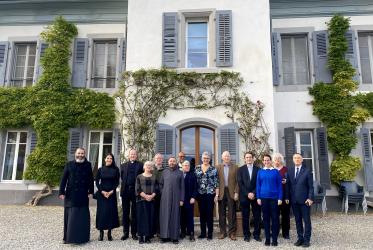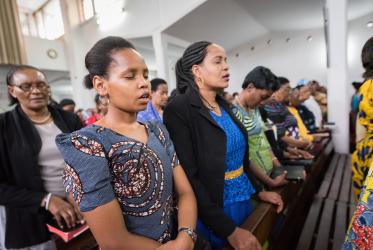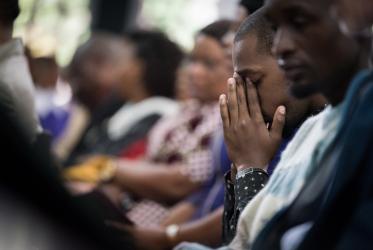Le Cénacle, Geneva, 7-10 May 1997
Response by Arne Fritzson to the paper "Baptism, Ecclesiology and Vocation"
First I would like to say a warm thank-you to Dean Dr Werner Schwartz for his most interesting paper about baptism, ecclesiology and vocation. I am especially grateful for this choice of subject because I believe that the connection between baptism and ecclesiology raises some very important questions that have too often been neglected in many of our discussions about ecclesiology in different contexts.
I do not feel that my task here today is to criticise Dr Schwartz' paper in an academic way, but rather to deepen the discussion. I should like to highlight some aspects that I find particularly important. And there are indeed a number of interesting items in his paper that I would like to discuss - more than can be raised in the limited time at my disposal.
Dr Schwartz discusses the interesting connection between baptism and the pouring out/coming down of the Spirit. As he says, these are two differentiated processes that are closely related to each other. But this relationship is not easy to grasp. As Dr Schwartz notes that in the story about the baptism of Jesus, these two processes happened directly one after the other. That these things happened simultaneously is also how Peter described it in his speech at Pentecost (Acts 2) where he says: "Repent, and be baptised every one of you in the name of Jesus Christ for the forgiveness of your sins; and you shall receive the gift of the Holy Spirit." Peter seems to say that these processes - baptism and the pouring out of the Spirit - take place at the same time..
But as Dr Schwartz points out, we have another pattern in the story about Philip in Samaria in Acts 8. There we are told that the Spirit is given after baptism when the apostles pray and lay their hands on the Samaritans. Again, we have a different pattern in the story about Peter and Cornelius in Acts 10 where the Spirit is given before baptism, and Peter says: "Can anyone forbid water for baptising these people who have received the Holy Spirit just as we have?"
So we have three different stories about the relationship between baptism and the giving of the Spirit. The giving of the Spirit takes place before, at the same time, and after baptism in these three different stories.
Now to me this is the way it should be: that we cannot easily make a pattern of how the relation between these two different processes works. Because this is something that transcends our ordinary reality, that is, the things that we can grasp with our senses. To me it is quite right that such things cannot easily fit into a system, because here we are close to a mystery, a secret, and we should not know too much about mysteries because then we would get the feeling that we have them in our hands, that we control them. We have mentioned three of the four stories in Acts about the giving /outpouring of the Spirit. The fourth one we find in Acts 19 in the story about Paul at Ephesus. The three earlier ones have something very interesting in common: they all take place when the apostles are somewhat hesitant to include people in the Christian fellowship, the church. When the apostles hesitated to proclaim the gospel to the people, the Spirit came down at Pentecost. When the question was whether the Samaritans, the "half-Jews", could be included in the church, the spirit came upon a city in Samaria. And again, when Peter was asking himself whether Gentiles should be included in the church, the Spirit came upon him at Caesarea. So what we clearly see is that the Spirit challenges the church to inclusiveness, and that is particularly interesting for those of us who are working on the issue of lay-participation towards inclusive community.
As Dr Schwartz says, the Spirit works as a differentiating force giving charisms to each one of the members of the church. An important chapter in Dr Schwartz' paper relates to 1 Corinthians 12, where Paul talks about the different charisms that the Spirit bestows on the members of the church. And that includes all the members of the church: "To each is given the manifestation of the Spirit for the common good" (v.7).
In this chapter Paul writes about the body and its members. The picture he uses is really strange, but we have grown so used to it that we do not see how strange it really is. Paul writes: "If the whole body were an eye" and "The eye cannot say to the hand, 'I have no need of you'" . What kind of body is that? But Paul means that it would be absurd for an eye to say to a hand 'I have no need of you'; a body that consists only of an eye would be as absurd as a church where not everyone is needed, or a church that promotes similarity among its members.
For me, being involved in the differently-abled issue, it is particularly interesting to see how the word 'weakness' is used in the text. Paul writes that "the parts of the body which seem weaker are indispensable" , and that "God has so composed the body, giving the greater honour to the inferior parts that there may be no discord in the body" . It is interesting to find this in the first epistle to the Corinthians because this was the main problem in the church in Corinth that Paul deals with in the first chapter, where he writes: "God chose what is weak in the world to shame the strong" . When Paul talks about God choosing the weak, he takes up a long biblical tradition that God chooses people for the sake of wholeness. We can mention Noah, Moses, Abraham, the Old Testament prophets, etc.
So what is the reason that God chose the weak, as Paul writes? Here we have the connection with baptism. To be baptised is to be united with Christ in his death . And the death of Christ has a link with/connection to the question about weakness. As Paul writes in the second epistle to the Corinthians: "For he (Jesus) was crucified in weakness but lives by the power of God. For we are weak in him, but in dealing with you we shall live with him by the power of God" .
So the vocation of the church, manifested in baptism, is to be a witness to the power which is made perfect in weakness . That means that the church has to be aware of the charisms that the Spirit has bestowed on every member of the church, which includes the members that seem to be the weakest. This approach to baptism, ecclesiology and vocation challenges us as members of different churches in the world, and it challenges especially the praxis of the churches.
We can ask the following questions: Are we taking care of the charisms that the church is given by the Spirit to each member for the common good? If not, what do we have to change in the lives of our churches in order to do this? How is the message of the cross reflected in fellowship? What values are seen in the churches' praxis?
For me this ecclesiology is an inspiration in my work on the differently-abled issue and other social issues. "The word of the cross is a folly", writes Paul . The word of the cross, that is the centre of the church, the meaning of baptism; to proclaim this word in word and deed is the vocation of the church.
The word of the cross has the opposite message to that which can be found in much of our world today, where efforts are made to persuade us that the ideal person is young, strong, beautiful, independent, and - I dare say - male. And it is so easy for such values to enter into the churches. That is why we have to keep reminding each other about the word of the cross, and the radically different values that the cross stands for. Dr Schwartz has done that today and I am thankful to him for that.




